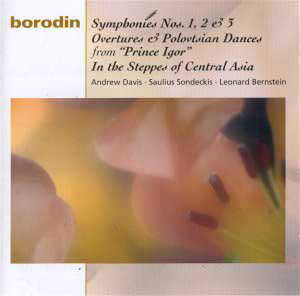Davis is extremely successful in putting across the champagne
and snowboots feyness and thunder of these works. He is aided by Sony's
mature sound. Gone is the edgy ferocity of the 1960s so beloved of CBS
(you can hear some of it in the Bernstein contribution). In its place
we have subtlety and refinement with a wide soundstage exploited for a
maze of antiphonal effects. These are best illustrated in the second and
fourth movements of the First Symphony.
I was intrigued to note how Davis reminded me, in the
finale of No. 1, of the Fourth Symphony of Schumann. Yes, that's the
Borodin symphony arrived at without the ministrations of Rimsky-Korsakov
and Glazunov. In the Second Symphony (as edited by Rimsky and Glazunov)
things go very well. The Third Symphony has long been a favourite of
mine - a work I hold in some affection. The violin sound is refined
and the woodwind (always a Borodin touchstone) a delight. Delight is
the word that leaps to mind also for Davis's Scherzo in No. 3.
I had never previously heard the Rimsky version (for
solo violin and orchestra) of the Notturno from the second quartet.
It makes for pleasant listening. The soloist is not listed. Bernstein
shows pulse-steady (even stolid) restraint for In the Steppes of
Central Asia - a work which is pure Borodin. Back to Davis and Canada
for the Igor extracts. All the virtues of his rhythmically coiled
approach to the symphonies are replicated here. I would have preferred
a slightly more stentorian balance for the brass antiphonal fanfares
at 3.30 in the Overture but this is good. Davis is at his considerable
best in the Igor Dances which go at such a lick that I thought
of Golovanov in the Mendelssohn Midsummer Night's Dream scherzo
(see the highly recommendable EMI GCOC issue). Davis takes
the Igor dances by the throat and the result conveys strongly
the exotic Tartar barbarity of the opera. He sounds much better than
Solti's pell-mell hectic sprint on Decca. Such a pity that the sturdy
and precise Toronto Mendelssohn Choir are not mentioned once in the
Sony documentation - which otherwise is admirable. We get full discographical
details for instance.
This set is up against stiff competition from a Double
Decca, ‘The Essential Borodin’ (455 632-2). This has all that the Sony
set offers plus the complete string quartet and some songs from Igor
and one free-standing song. However the Sony gives you a consistent
presentation of the Toronto folk and Davis. Decca offer a superior Martinon
version of No. 2 and a flaccid account of No. 3. I have not heard the
Ashkenazy/RPO but I understand that it sounds well indeed on both interpretative
and audio counts.
There is room in Davis’s case for a yet more violent
approach to the pacing but this is still extremely good. The strengths
are fully on display in the opening of the final allegro of the Second
Symphony. This sparkles, shudders, swoons and flickers. There are some
startling bass thuds which add to the effect.
The Toronto recordings were criticised when they first
came out. They sound healthy enough now; perhaps a mite hard-edged when
loud but nothing serious.
I am sure that St Petersburg Notturno is DDD
but the notes do not claim it as such.
Rob Barnett


